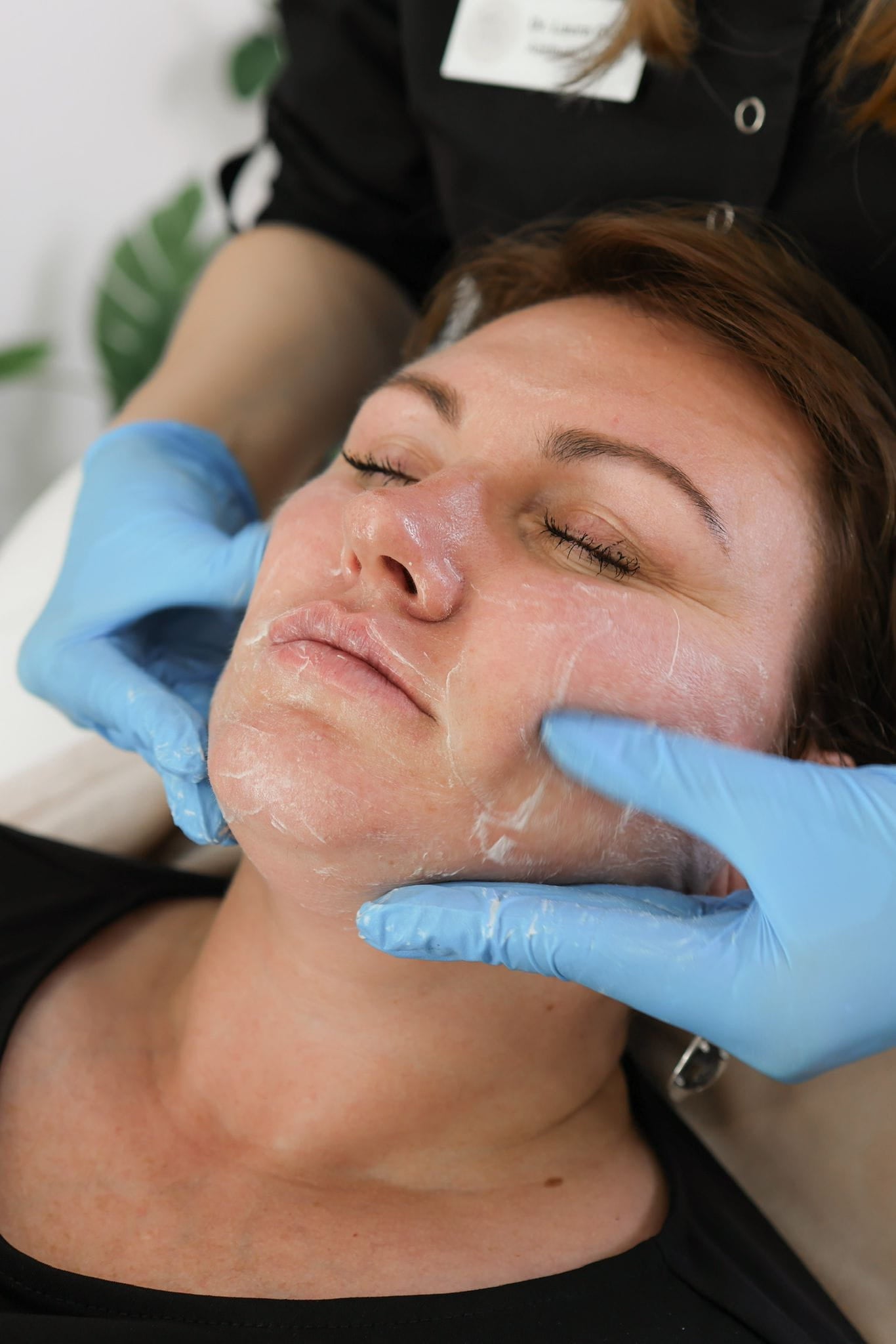Cosmelan Depigmentation Peel for Dry Skin
Cosmelan, a professional-grade depigmentation peel, has gained popularity for addressing hyperpigmentation concerns like sunspots and melasma. For those with dry skin, the effectiveness of Cosmelan can be a point of interest, especially considering its reputation for deep exfoliation.
Understanding Cosmelan
Cosmelan is formulated with potent ingredients that target melanin production, aiming to reduce the appearance of pigmentation issues. While effective for many skin types, its potential impact on dry skin requires careful consideration.
The deep exfoliation associated with Cosmelan can potentially exacerbate dryness, leading to irritation or discomfort. Individuals with naturally dry skin may experience increased sensitivity and flaking during the peeling process and post-treatment recovery.
It’s crucial for individuals with dry skin to consult with a qualified dermatologist before undergoing a Cosmelan peel.
A dermatologist can assess individual skin type, condition, and medical history to determine if Cosmelan is suitable and advise on appropriate pre- and post-treatment skincare protocols to minimize dryness and potential complications.
How Cosmelan Works on Dry Skin
Cosmelan works by inhibiting melanin production at multiple stages. It contains a blend of potent ingredients, including hydroquinone, kojic acid, and azelaic acid, which target tyrosinase, the enzyme responsible for melanin synthesis. This multi-pronged approach aims to reduce the formation of new pigment and lighten existing pigmentation.

On dry skin, however, the deep exfoliation inherent in Cosmelan may exacerbate dryness rather than improve it. The peel’s active ingredients can strip away protective oils, leading to increased flakiness, irritation, and sensitivity.
To mitigate these risks, individuals with dry skin should carefully consider the potential drawbacks and consult with a dermatologist. Proper preparation and post-treatment care are essential to minimize dryness and promote healing.
Benefits of Cosmelan for Dry Skin
Cosmelan Depigmentation Peel is designed to address hyperpigmentation concerns but may not be the most suitable option for those with dry skin.
While Cosmelan effectively targets melanin production through its potent ingredients like hydroquinone, kojic acid, and azelaic acid, it can lead to increased dryness and irritation on already dry skin.
- The deep exfoliation associated with Cosmelan can strip away protective oils from the skin, exacerbating dryness and sensitivity.
- Individuals with dry skin may experience heightened flaking, itching, and discomfort during and after the peeling process.
Therefore, it is crucial for people with dry skin to consult a dermatologist before undergoing a Cosmelan peel. A dermatologist can assess individual skin type and condition to determine if Cosmelan is appropriate and provide personalized pre- and post-treatment recommendations to minimize dryness and potential complications.
Potential Side Effects and Risks
Cosmelan, a professional-grade depigmentation peel, works by inhibiting melanin production through ingredients like hydroquinone, kojic acid, and azelaic acid. While effective for many, its deep exfoliation can pose challenges for dry skin.
The peel’s potent actives can strip away protective oils, leading to increased flakiness, irritation, and sensitivity on already dry skin. Individuals with naturally dry complexions may experience heightened discomfort during the peeling process and post-treatment recovery.
It is crucial for those with dry skin to consult a dermatologist before considering Cosmelan.
A dermatologist can assess individual skin type, condition, and medical history to determine if Cosmelan is suitable and provide personalized pre- and post-treatment skincare protocols to minimize dryness and potential complications.
Procedure and Preparation
Cosmelan Depigmentation Peel works by inhibiting melanin production through a blend of potent ingredients like hydroquinone, kojic acid, and azelaic acid. These ingredients target tyrosinase, the enzyme responsible for melanin synthesis. While effective for many skin types, its deep exfoliation can be challenging for those with dry skin.
The peel’s active ingredients can strip away protective oils, leading to increased flakiness, irritation, and sensitivity on already dry skin. Individuals with naturally dry complexions may experience heightened discomfort during the peeling process and post-treatment recovery.
Individuals considering Cosmelan for dry skin should consult a dermatologist.
A dermatologist can assess individual skin type, condition, and medical history to determine if Cosmelan is suitable. They can also provide personalized pre- and post-treatment skincare protocols to minimize dryness and potential complications.
Recovery and Aftercare
Cosmelan Depigmentation Peel is designed to address hyperpigmentation concerns but may not be the most suitable option for those with dry skin. While effective at targeting melanin production, its deep exfoliation can lead to increased dryness and irritation on already dry skin.
The peel’s potent actives, including hydroquinone, kojic acid, and azelaic acid, can strip away protective oils, leading to heightened flakiness, itching, and discomfort during and after the peeling process.
For individuals with naturally dry complexions, Cosmelan may exacerbate existing dryness rather than improving it.

It is crucial for those considering Cosmelan with dry skin to consult a dermatologist. A thorough assessment of individual skin type, condition, and medical history is essential to determine the suitability of Cosmelan and develop personalized pre- and post-treatment skincare protocols.
Effectiveness in the UK
Cosmelan Depigmentation Peel is known for its effectiveness in addressing hyperpigmentation concerns like sunspots and melasma. However, individuals with dry skin should approach it with caution due to the potential for increased dryness and irritation.
The peel’s deep exfoliation process can strip away protective oils, leading to heightened flakiness, itching, and discomfort. Those with naturally dry skin may experience a more pronounced reaction compared to other skin types.
Before considering Cosmelan, it is crucial for individuals with dry skin to consult a dermatologist. A qualified professional can assess individual skin type, condition, and medical history to determine if Cosmelan is suitable and provide personalized pre- and post-treatment skincare recommendations.
These recommendations may include using hydrating serums, moisturizers, and avoiding harsh products that can further exacerbate dryness during the peeling process and recovery period.
Cost and Availability in the UK
Cosmelan Depigmentation Peel is a professional-grade treatment designed to address hyperpigmentation concerns such as sunspots and melasma. While effective for many skin types, its deep exfoliating properties can pose challenges for individuals with dry skin.
The peel’s potent ingredients, including hydroquinone, kojic acid, and azelaic acid, target melanin production to lighten existing pigmentation and prevent new pigment formation. However, this deep exfoliation can strip away protective oils from the skin, leading to increased dryness, flakiness, and sensitivity in those with naturally dry complexions.
In the UK, Cosmelan is available through qualified dermatologists and aesthetic clinics. The cost of a Cosmelan peel varies depending on the provider, location, and number of treatments required. It typically ranges from £300 to £600 per session.
Alternative Treatment Options
Cosmelan Depigmentation Peel is designed to address hyperpigmentation concerns but may not be the most suitable option for those with dry skin.
While effective at targeting melanin production, its deep exfoliation can lead to increased dryness and irritation on already dry skin. The peel’s potent actives, including hydroquinone, kojic acid, and azelaic acid, can strip away protective oils, leading to heightened flakiness, itching, and discomfort during and after the peeling process.
For individuals with naturally dry complexions, Cosmelan may exacerbate existing dryness rather than improving it.
Alternative treatment options for hyperpigmentation in individuals with dry skin include:
- Topical treatments containing ingredients like vitamin C, niacinamide, and retinol can help brighten skin and reduce pigmentation without deep exfoliation.
- Chemical peels formulated for sensitive or dry skin may be a gentler alternative to Cosmelan.
Laser therapy, specifically fractional laser resurfacing, can target pigmented areas while stimulating collagen production. However, this option requires careful consideration for dry skin as it can also cause temporary dryness and sensitivity.
Consulting with a dermatologist is crucial for determining the most suitable treatment plan based on individual skin type, concerns, and medical history.
Ask about the Cosmelan Depigmentation Peel process at It’s Me & You Clinic with Dr. Laura Geige.
